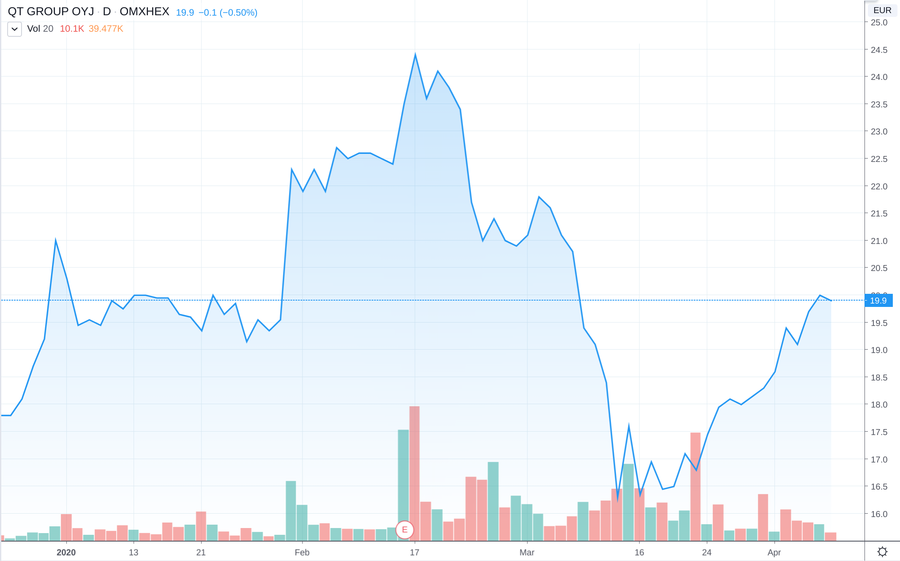Qt Could Go Proprietary, KDE Relationship And Qt-Based Free Software In Jeopardy
The Qt Company, maker of the popular Qt toolkit used by a lot of free software, announced that they would be restricting LTS releases of the Qt toolkit to paying customers in a widely criticized move back in January, 2020. They are currently strongly considering taking that one step further by restricting all Qt releases to paying license holders for the first 12 months. This jeopardizes the future of the popular KDE Plasma desktop environment as well as the LXQt desktop environment and it puts the wisdom of using the Qt toolkit for free software development in question.
written by 林慧 (Wai Lin) 2020-04-08 - last edited 2020-04-15. © CC BY

The Qt Company, maker of the popular dual-licensed Qt toolkit, is currently trading around €20 per share at NASDAQ Helsinki.
Germany KDE developer Olaf Schmidt-Wischhöfer, who works at the European Association of Development Research and Training Institutes when he is not volunteering for the KDE community, has published a very worrisome message about the relationship between the Qt Company (QT Group Oyj, QTCOM, currently trading at €19.90) and the KDE community on the KDE community mailing list.
The Qt Company has so far released Qt under a dual-license model where free software users and developers have been able to use the toolkit for free under the GNU GPL while commercial developers of immoral proprietary software have been required to license the toolkit under a commercial license. The possibility of Qt Company pulling the rug on the free software community by ending this dual-license model has been a real concern for quite some time. This threat become very real when the Qt Company announced that Qt Long Term Support releases would be restricted to paying license holders back in January 2020.
The KDE foundation, in its infinite wisdom, cemented the special relationship between Qt and the free software community in an written agreement years ago. This agreement requires the Qt Company to keep releasing "All parts of Qt (..) under the GPLv3 or under a compatible license". That's nice, but there is a loophole:
"If these license terms are not yet present at the time of the Qt release, then they must be applied within a timeframe of not more than 12 months."
It appears that the Qt Company are hell-bent in exploiting this loophole to the fullest extent possible by closing off both LTS versions and development versions of Qt for 12 months from their release. That move poses huge problems for both the KDE community and the parts of the free software community who utilize the Qt toolkit in general. Let's say that a huge gaping security hole in Qt, which affects KDE or other free Qt-based software, is found. It would be very unfortunate if free software users would have to remain vulnerable for a full year before they could have access to a newer version with a fix.
The 12 month restriction would, in principle, not make Qt proprietary software, but it might as well be proprietary from a practical point of view.

The popular KDE Plasma desktop environment.
Those who use KDE or Qt based software may want to read the entire message titled "Qt, Open Source and corona" from Olaf Schmidt-Wischhöfer on the KDE community mailing list:
"Dear KDE community,
the relationship between the KDE community, the Qt project and The Qt Company has always been close and beneficial for all three.
- The Qt Company benefits from having a large and healthy community of contributors, developers and experts around their product.
- KDE benefits from being able to use Qt and to contribute directly to Qt.
- The Qt project benefits from having the company as a steward and very large contributor, and having KDE as a large and well-known sub-community.
Last December, I published a document explaining the win-win-win-relationship: http://www.olafsw.de/a-better-qt-because-of-open-source-and-kde/
Unfortunately, The Qt Company is currently considering to stop this healthy cooperation.
Fortunately, the KDE Free Qt Foundation exists, which secures the continued existence of Open Source Qt: https://kde.org/community/whatiskde/kdefreeqtfoundation.php Together with Martin Konold, I represent KDE in the board of the foundation.
I will now give you a bit of background information.
During the past two years, there have been negotiations between The Qt Company and the KDE Free Qt Foundation for updating the contract.
Our goals in negotiations:
- helping the company increase their revenue without harming the Qt project or the KDE community
- strengthening the protection of the Qt project and of the KDE community
- avoiding a parting of ways between The Qt Company and the Qt+KDE communities
Concrete areas included in the negotiations are:
- Fixing the incompatibility between paid Qt license terms and using or contributing to Open Source (“Prohibited Combination” in https://www.qt.io/terms-conditions/ )
- Fixing the license incompatibility between the Qt Design Studio (which is only partly Free Software) and our existing contract with the company
- Making our contract with the company stronger, requiring them to make immediate Free Software releases of Qt (currently, they are allowed to delay by 12 months) to ensure the availability of LTS security fixes for KDE
- Updating our contract to include Wayland
- Evaluating contract changes suggested by the company aimed at making the Qt business more profitable, for example the option of selling bundles of Qt with other software, or making integrations with proprietary third-party software possible
One setback in the negotiations has been an announcement of The Qt Company in January: https://www.qt.io/blog/qt-offering-changes-2020 They announced that LTS releases of Qt will only be available for paid license holders. It is still unclear what this implies for contributions to Qt and for the sharing of security fixes between the various parties (including The Qt Company, the many Qt experts contributing, the KDE community, and Linux distributions).
At an in-person meeting in Frankfurt on March 6, we nevertheless managed to lay the groundwork for a possible path forward, continuing with an approach beneficial to all sides.
But last week, the company suddenly informed both the KDE e.V. board and the KDE Free QT Foundation that the economic outlook caused by the Corona virus puts more pressure on them to increase short-term revenue. As a result, they are thinking about restricting ALL Qt releases to paid license holders for the first 12 months. They are aware that this would mean the end of contributions via Open Governance in practice.
Obviously, it cannot be in the middle- and long-term health of The Qt Company to separate itself from the very strong Qt + KDE communities.
We hope The Qt Company will reconsider. However, this threat to the Open Source community needs to be anticipated, so that the Qt and KDE communities can prepare themselves.
The Qt Company says that they are willing to reconsider the approach only if we offer them concessions in other areas. I am reminded, however, of the situation half a year ago. We had discussed an approach for contract updates, which they suddenly threw away by restricting LTS releases of Qt instead.
What does this mean for the future of Qt and for the future of KDE?
All software changes in Qt will still be available at as Open Source as required by our contract – maybe with a delay of 12 months if the company decides to part ways with the communities.
We will continue to work on a contract update that helps all sides. But even if these negotiations were to be unilaterally stopped by The Qt Company, Qt will stay Open Source, and KDE will be able to use it. I am also absolutely sure that the Qt + KDE communities will continue cooperation on new features, bug fixes, and security fixes, even should The Qt Company decide to forgo the benefits of cooperation.
I invite The Qt Company to stay with us. It will be worthwhile.
Best regards,
Olaf"
April 8th, 2020
The Swedish KDE contributor and FOSS enthusiast Jens Reuterberg has this to say about the Qt Company in a reply on the KDE Community mailing list on April 8th:
"The fact that they want to burn the field and still think they can harvest come spring is to me ridiculous and seems to be done by someone who has no understanding of the process of work involved in their own project on the technical or social level."
Krita developer Boudewijn Rempt had this to say about the free software community's options going forward:
"If we work together with other participants in the Qt community, then it might be feasible. In fact, I think it's necessary to start bringing together a group of stakeholders and start preparing for a fork."
We do hope that the Qt company will reconsider and allow both development versions and LTS versions of Qt to be licensed under the GNU GPLv3 from day one. However, we are not convinced that using Qt is a good idea even if they do: The Qt Company has shown that they are not trustworthy. They lost massive amounts of face when they broke the spirit of their agreement with the free software community by restricting LTS releases to commercial users back in January. They lost additional face when they dishonored and disgraced themselves by sending a message to the KDE e.V. board and the KDE Free Qt Foundation saying that they will likely restrict all versions of Qt to commercial users for 12 months from their release. They have now put themselves in a position they can not get out of in any even remotely honorable way. The Qt Company would lose additional face if they back-pedal and show that they are weaker than a bunch of hippies in a non-profit foundation and they would lose massive amounts of face and dishonor themselves on a grand scale if they break the spirit of their agreement with the free software community by restricting Qt releases to a proprietary license for the first 12 months. There is no honorable face-saving way out of this. Thus; free software developers, and users, should seriously question and consider whether they want to have anything to do with the Qt Company and their products going forward.
 |
Update: The Qt Company released this rushed and rather vague statement in their blog on April 9th:
"There have been discussions on various internet forums about the future of Qt open source in the last two days. The contents do not reflect the views or plans of The Qt Company. The Qt Company is proud to be committed to its customers, open source, and the Qt governance model." Petteri Holländer in a blog post titled Qt and Open Source, April 9th 2020
It would appear that the public backlash has made the Qt Company leadership seriously reconsider the wisdom of immensely angering the entire free software community. |


Enable comment auto-refresher
Anonymous (e2b5e3d2)
Permalink |
Intgr
Anonymous (e2b5e3d2)
Permalink |